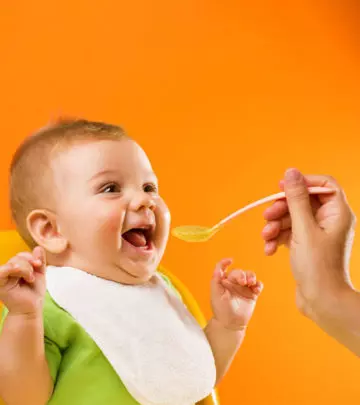
Image: iStock
When you think about all the processed baby food in the supermarket isles, it seems like life is so easy. The neatly labeled, seemingly hygienic food stuff for baby there can be, is pretty enticing investment once your baby begins to start eating solid food. It could be a wonderful milestone to reach, but solid food, to begin with, is fairly simple and easy to make for your baby. So is it worth the money and the effort to go the supermarket and fetch ready-to-eat baby foods? Especially when most of what you need is to have a food processor or a small mixer/grinder. Here are the benefits of making baby foods at home:
1. Freshness Of The Food
Does your baby need to have stale food? Well, that is what I call canned and bottled processed foods for babies. Not that they are not well-preserved, but I cannot fathom them being any fresher than a puree that has just come out of a food processor which is rich in nutrients, is juicy, tastes, and smells fresh. Your baby can also know the difference and can enjoy a freshly prepared puree than the canned version.
2. It Doesnât Take Much Effort
Your baby is still getting introduced to different tastes and foods. So you don’t have to worry about making a king-size meal for him yet. All that you need to know is as to what your baby would have at what time of the day. If you chalk out a schedule, you know what you must cook for your little one. Just make sure you have washed the vegetables thoroughly before you mash it into a puree or make soup out of it.
3. You Can Avoid The Unnecessary Additives
Baby foods on the market contain salt, sugar, butter, and unnecessary additives such as starch. When you prepare these foods at home, you can totally cut down on the unnecessary additives for your baby and avoid its route to obesity!
4. You Can Avoid Pesticide Exposure
Pesticides are bound to be there unless you buy organic vegetables or food grains. You might want to go to the aisles that sell organic foods, else if you want to make it more fun, do some fruit and vegetable plucking on the weekend. So you know your baby food is free from pesticides.
5. Making Baby Food At Home Is Money-Saving
Now take this part. You are not actually ‘investing’ in processed baby foods. Call it an unnecessary expenditure unless you are traveling which is when processed baby foods are useful. So it might be a good idea to buy these stocked foods only before you intend to travel and you know that homemade food wouldn’t last long during your travel with your baby. You can, however, freeze homemade food in ice cube trays and then cover them with plastic wrap. I would recommend storing them for not over a couple of days though because freezing and reheating would only diminish the nutrients in your baby food.
6. Get A Bit Eco-Friendly
By making home-made food for your baby, you are also avoiding the number of plastic jars and cans that would otherwise go into the garbage or for recycling. By purchasing baby foods from the counters, you are only promoting more and more packaging and indirectly impacting the ecosystem by increasing the manufacture and shipping. Just stay out of it, and you would be going green!
7. Introduce Foods One At A Time
Bananas are very good for babies as it also makes it chewable. Avocados also make a good choice among your baby’s first foods. Apples, peas, carrots, sweet potatoes, and pears make some of the best foods to begin with. However, it might be a wise idea to introduce these foods one at a time so as to habituate your baby to the distinct tastes and also observe if your child is allergic to any of the foods. Do remember to make thin puree initially. You can make thick purees as your baby grows.
So here are a few benefits of making homemade food for your baby. Share with us your experiences of introducing to your baby the first solid foods made at home.












